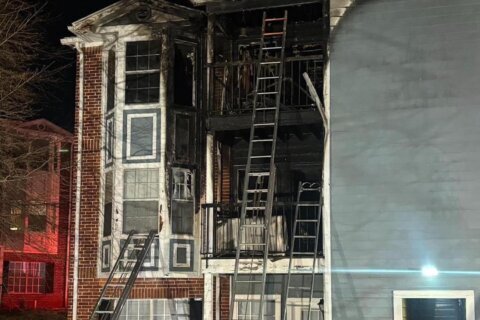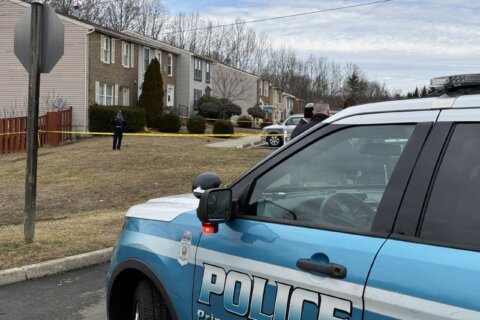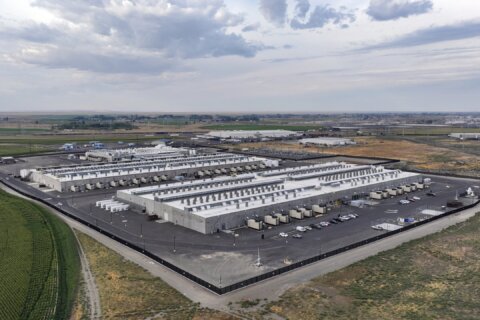This article was republished with permission from WTOP’s news partner InsideNoVa.com. Sign up for InsideNoVa.com’s free email subscription today.
This article was written by WTOP’s news partner InsideNoVa.com and republished with permission. Sign up for InsideNoVa.com’s free email subscription today.
Virginia health officials responded to concerns Monday night from the Prince William chapter of the National Coalition of 100 Black Women about equity in the COVID-19 vaccine rollout in the county.
The virtual meeting was prompted by a letter the chapter sent in mid-March regarding what so far has been disproportionate distribution of the vaccine by race and ethnicity. Officials from the Virginia Department of Health and leaders of the state’s vaccination effort tried to assure the coalition members that more is being done to get doses to Black and Hispanic people in the county.
Dr. Norman Oliver, Virginia’s health commissioner, told the group that vaccine rates among Black and Hispanic Virginians is steadily improving. During the first phase of the rollout, about 12% of the doses supplied by state health departments wound up in the arms of Black residents. For the Hispanic population, the number was even lower at 6%.
Today, Oliver said, African-Americans make up about 18% of those currently receiving shots, and Hispanic or Latino residents make up about 12%. The state is about 20% African-American and roughly 10% Hispanic.
The story in Prince William is different, though. Of the roughly 63,956 people in the county who’ve received at least one shot and whose race or ethnicity was reported, 19.5% have been Hispanic and 13.1% have been African-American. According to the Census Bureau’s 2019 population estimate, the county is 24.5% Hispanic or Latino and 22.2% Black or African-American.
That disparity drove the coalition members to write health department officials asking that they do more to get shots in the arms of Black and Hispanic residents.
“Over the past months, we observed that the turnout for people of color in PWC is very low compared to their white counterparts. We are devastated that the State has not taken enough initiatives or provided leadership to meet the needs of our people of color constituents,” the letter to Oliver reads.
Along with a list of recommendations, the chapter said there were two sides to the core issue of disproportionate distribution. First, vaccination access should be expanded for Black and Hispanic people by establishing more vaccine clinics in their neighborhoods as well as along bus routes and aggressively advertising them. But they also said that health officials should be more proactive in pushing back against some of the misleading narratives being passed around about the vaccine itself.
Bishop Patrick Thomas of Dale City Christian Church told state officials that he could see the situation improving to some degree and that more of his congregants were successful in registering for vaccines.
But still some concerns persisted, he said. In particular, some parishioners had told him that they’d be waiting because of the “emergency” authorization of the vaccines, which some people thought to mean that they weren’t fully vetted.
“One of the things that we are hearing among our people is, they’re saying that the CDC really hasn’t approved the vaccine, it’s emergency approved,” said Thomas, asking for guidance on how to respond to that concern.
Dr. Vanessa Walker Harris, Virginia’s deputy secretary of Health and Human Resources, said all the vaccines were rigorously studied and that no safety testing was skipped. Rather, because of the extraordinary urgency brought on by the worldwide pandemic, some steps were completed concurrently.
“All of the appropriate steps were taken; no shortcuts were taken. We were just able to ramp up and do things on parallel tracks rather than one after another,” she added.
Two vaccination clinics are being held this Thursday on the eastern side of the county, and Deputy Secretary of the Commonwealth Traci DeShazor also told the group about an advertising push the state is launching that can be tailored for individual communities and ethnic groups.
With free marketing materials to which community organizations can add their logos and distribute, the idea is to have the push to be vaccinated coming from both governmental entities and community institutions that are known and trusted.
“We have women that actually look like people that we know and we interact with on a daily basis representing our community,” DeShazor said. “There’s going to be an entire catalog they’re going to give you if you do an outreach event.”
In the same way, DeShazor said, the health department wanted to tailor vaccination sites to the groups they’re intended to reach.
On Thursday, one clinic will be held at Todos supermarket in Woodbridge, where officials said the hope was to get some walk-ins for people simply going grocery shopping. Obtaining advanced registration in heavily Hispanic and Spanish-speaking areas has proven difficult, and Spanish-speakers would be on site to explain the process and quell any fears. For example, officials said, immigration status is not asked about, and insurance is not necessary.
The other clinic will be held at First Mount Zion Baptist Church near Dumfries, with pre-registration taking place in person and on the phone for those without access to the internet or some who don’t trust the online sign-up. Decisions on where to stand up vaccination clinics have been assisted by Deloitte, a consulting firm the state has brought on to help crunch data down to the census-tract level about vaccination uptake and more.
“An equity approach is a tailored approach; you’re giving communities what they need and how they need it,” DeShazor said.
Finally, state officials asked the group to let people know there are no ideas the state won’t consider when planning vaccination sites. If a church thinks it would be a good site for a clinic, tell them why, they said. If seniors are having trouble getting to vaccine sites, maybe a mobile clinic would work.
Ultimately, DeShazor said, the state needs people on the ground to communicate what could work best to reach the hardest to reach.
“We don’t have any blanket solutions, we really are looking on a case-by-case basis,” she added. “Where do you see the challenge … and what resources do we have to address the challenge?”
- Sign up for WTOP alerts
- Latest coronavirus test results in DC, Maryland and Virginia
- Coronavirus vaccine FAQ: What you need to know
- Latest vaccination numbers in DC, Maryland and Virginia
Looking for more information? D.C., Maryland and Virginia are each releasing more data every day. Visit their official sites here: Virginia | Maryland | D.C.







